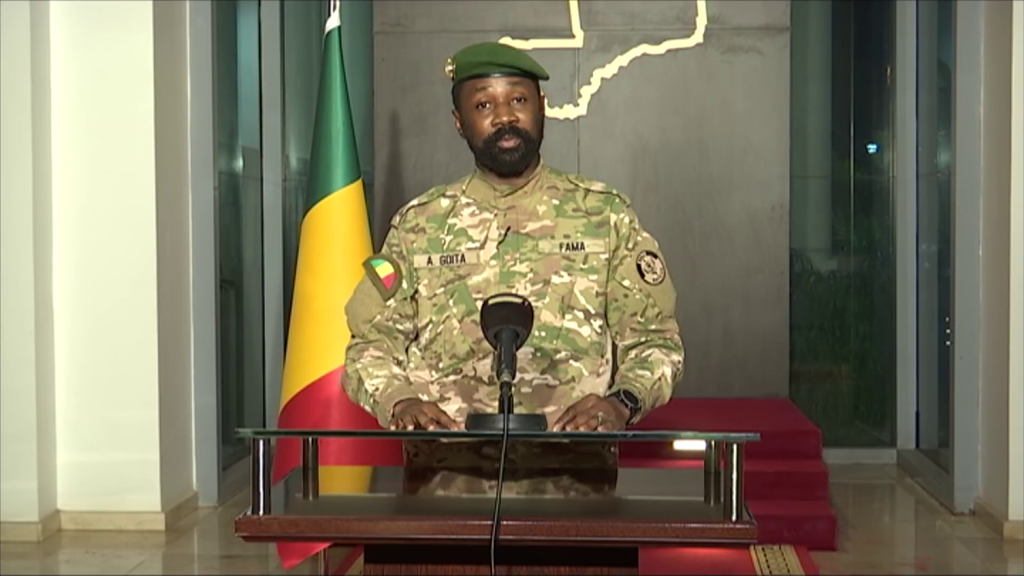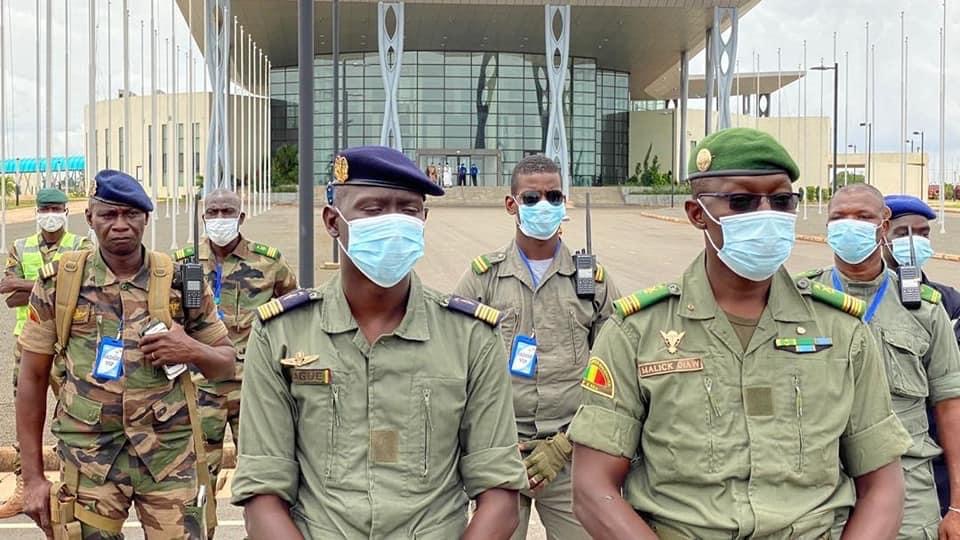
Assimi Goita, the current leader of Mali.
“The FAMA will relentlessly continue their mission of protecting populations throughout the national territory,” reassures the Army.”
The Malian Armed Forces (FAMA) recently publicized a series of successful counter-terrorism operations against armed extremist groups throughout the country. According to the first excerpted article from Arabic-language Moroccan electronic newspaper Tamaghrabit, FAMA announced that it had successfully eliminated Abu Hudhayfah, a former Polisario Front separatist and one of the leaders of the Islamic State in the Greater Sahara (ISGS). Prior to his time with the ISGS, Hudhayfah was allegedly trained by the Algerian Army and his joint affiliation has signaled a connection between separatist and terrorist organizations in the region. Hudhayfah was also suspected to have assisted with attacks on U.S. and Nigerian forces in Niger in 2017. Mali and the greater Sahel region have faced a significant and sustained threat from armed extremist groups for multifaceted reasons ranging from weak governmental leadership, less international counterterrorism support, and instability in neighboring nations.[i] Although Hudhayfah will undoubtedly be replaced, the FAMA’s successful operation against ISGC is a needed disruption and morale boost for local forces.
Following FAMA’s successful operation against Hudhayfah, the Malian military claimed several other successful counterterrorism operations throughout the Diafarabé area, Ségou region. According to the second excerpted article from Burkina Faso’s French-language independent newspaper, 24heures, the General Staff of the Armed Forces announced air strikes and ground operations that targeted training camps and logistical bases near Nouh Bozo, a village in the center of the country located along the bank of the Niger River. Before kinetic operations, FAMA used information derived from “specialized services” to conduct surveillance and reconnaissance on each target. It was believed that the unnamed terrorist organizations operating the camps intended to “transform the area into sanctuaries to prepare their dark actions against the populations and store their logistics there.” In addition to the destruction of training camps and logistical storage areas, FAMA claimed to have destroyed fuel shipments destined for terrorist organizations throughout the country. The security situation in the Sahel continues to be plagued with instability and terrorism. External players like Russia continue to garner influence in the region. With U.S. troops withdrawing from neighboring Niger, the forces to counter a growing terrorist threat in the Sahel are even more sparse. Mali’s ability to independently conduct kinetic operations against high-value targets may indicate a renewed focus on securing their nation, which could have a positive impact across the region.
Sources:
“الجيش المالي يعلن القضاء على الانفصالي “أبو حذيفة” ويؤكد علاقة البوليساريو بالإرهاب (The Malian army announces the elimination of the separatist “Abu Hudhayfah” and confirms the Polisario’s relationship with terrorism),” Tamaghribit (Moroccan newspaper), 1 May 2024. https://www.tamaghrabit.com/?p=19302
The Malian army announced the elimination of the former Polisario Front separatist and leader of ISIS in the Sahara region, called “Abu Hudhayfah” and nicknamed “Hugo,” in a qualitative operation in northern Mali.
It is noteworthy that “Abu Hudhayfah” had previously received intensive training in the Tindouf camps under the supervision of Algerian army officers… before he was sent to northern Mali to join what calls itself the Islamic State in the Greater Sahara. He will then be succeeded by Adnan Abu Al-Walid Sahrawi, who was in turn a leader in the Polisario terrorist organization, before leading ISIS.
The liquidation of the so-called “Abu Hudhayfah” confirms Morocco’s view that the terrorist phenomenon and the separatist phenomenon are linked, and that terrorism is a form of secession… given that terrorist organizations seek to establish political entities on the outskirts of countries where the security focus is less… and thus create “zones of savagery.” “It is managed to reach what is called in the organizational literature the “empowerment stage.”
Source: “Des regroupements de terroristes identifiés et traités avec succès (Groups of terrorists identified and successfully treated),”24heures (Burkina Faso newspaper), 9 May 2024. https://www.24heures.bf/mali-des-regroupements-de-terroristes-identifies-et-traites-avec-succes-communique/
The harvest seems good for the Malian Armed Forces (FAMA). From May 6 to 8, they began a “hunt” against armed terrorist groups in several parts of the country. Several terrorists have been “neutralized” according to a press release from the General Staff of the Armed Forces dated May 8. A “major local terrorist leader” was also reportedly killed.
“Based on information obtained by specialized services, the FAMA has been carrying out an active surveillance and reconnaissance campaign for several days in the Diafarabé area, Ségou region,” indicates the General Staff of the Armed Forces. This requires, he says, careful work and patience. These operations led to the location and identification of several fallback bases located in forest areas. According to the Malian Army, armed terrorist groups plan to transform this area into sanctuaries. To prepare their “dark actions against the populations and store their logistics there.” Air strikes followed by ground action targeted training camps and logistical bases around Nouh Bozo, on the right bank of the Niger River, on May 6 and 7, 2024.
“The FAMA will relentlessly continue their mission of protecting populations throughout the national territory,” reassures the Army.The Malian Forces are thus on the hunt for armed terrorist groups who sow terror and desolation both within the Defense and Security Forces and among civilians. In this context, several air and land operations are carried out in several parts of the national territory. This Sahel country also intends, in its drive to fight terrorism, to cut off the sources of fuel supply for armed groups.
Notes:
[i] Mali has faced multiple radical Islamist factions, including Al-Qaeda’s Jama’at Nusrat al-Islam wal Muslimeen (JNIM), and the Islamic State’s Islamic State in Greater Sahara affiliate branches, which have been responsible for numerous deadly attacks throughout the country and have even been able to control territory. The Council on Foreign Relations Global Conflict Tracker published a detailed background and analysis on violent extremism in the Sahel to provide contextual information on the issued faced in Mali and neighboring nations. See: “Violent Extremism in the Sahel,” Council on Foreign Relations Center for Preventative Action, Updated 14 February 2024. https://www.cfr.org/global-conflict-tracker/conflict/violent-extremism-sahel
Image Information:
Image: Assimi Goita, the current leader of Mali.
Source: https://commons.wikimedia.org/wiki/File:Assimi_Goita,_August_2021.png
Attribution: Public Domain


